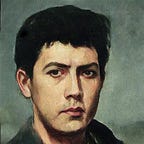At The Hour of Our Death
The aroma. We smell something far away, and our chest feels compressed, the heart as if electrocuted, and the brain triggered slightly more than we could anticipate. It’s not long before we know what this sensory response means, which memory it refers to. But the confusion arises in what we are supposed to feel about, for the time tracking and place picking usually does the job with full confidence. Mistaken or not we slept away our worried minds. We will never know for sure, our humane ability is to forget. Life is endurable because we forget.
Forget, and we fight back, and it wanders become confusion. Confusion, following our arduous steps in every stance. To be the never-ending nobody in whenever region we stumbled upon. We could never explain it well enough with the utterance of words, as if it has the same intensity as our sentiments inside. We forgot what we wanted to say, the noise in our communication starts within ourselves, and there are layers that dull the mind. We are never keen on psychology or such, but the least — is that we would be around looking it backwards to understand our condition.
Backward. The confusion occurred repeatedly in some period to come by, and the content was rather similar. But as we got into our mundane everyday life activity, there was a long silence between us before we brought up again our issues to ourselves. We said that something is clinging back — as if it has ever gone, just at the time we arrived again at anything that could be the ignition of our confusion. We reminisce expecting good comebacks, yet the opposite. Everything began fresh again, the very prototype of our traumatizing experience.
Don't fall in love with your suffering. Never presume that your suffering is in itself proof of your authenticity. Renunciation of pleasure can easily turn into the pleasure of renunciation itself.— Slavoj ZizekEveryone is suffering as long as they live. Suffering is not constant but it sure returns — as long as we live. We love our existence so we do not end it. Therefore love is rather a negative fact, and everyone is having it, as long they are still alive. At the moment we ended our life, that’s when our love is no longer exists. We probably tired of it or we felt the love differently.
By all means, we shall not put love in the same domain as our ‘like’ for ice creams, or an idol to ‘adore’, or being ‘passionate’ about our hobbies. Fondness and affections though go quite well with the word ‘love’, they feel too specific, demanding, and crowded. Love that is the simplest and strangest of them all — is the life, the world, and our existence. To not kill oneself is the sole and certain possession of so-called love, to be in love, self-love — to realize how the terms are really popular and celebrated.
Our world is the first and only world. Does not matter how our life and the world turned out, how it treated us, how we treated them, all the flaws, the suffering, and confusion — yet we’re still here, just to suffer. Love is when we don’t turn our back on something full of negative facts that suffer us. Many in their whole life could never attain and maintain such thing, let alone escalate the default. This love can go further with every other matter within the world. But our existence is the totality of what we have.
The world of melancholia was humid, heavy[..] These choked vessels, this heavy, clogged blood that the heart labors to distribute throughout the organism, and which has difficulty penetrating into the very fine arterioles of the brain, where the circulation ought to be very rapid in order to maintain the movement of thought—it is all this distressing obstruction which explains melancholia. Heaviness, encumbrance—here again the primitive qualities guide analysis. — Michel FoucaultThis heaviness is a concrete biological condition, yet we often perceive it as immaterial, and patternless. We began the melancholia in our present time and we looked back to find its opposition in cryptic. Melancholic love is as many as negative facts. We still love a pet we have to put down, but we are not experiencing the love in the same way as our pet being healthy and its joyful existence. It is something dark, and mournful — yet the highest state of our consciousness. We value our suffering because it makes us closer to the default state of our existence. We do not question ourselves anything when we are happy, we just live the moment of no comparison. Memories of a young kid, with an outer body a dying old man.
Life yesterday seems long and gone, and our restless memory lasts throughout generations. We parallel everything in the past — and future, as somewhat better to our current, and wishes granted, through awkward imagination. We don’t know ourselves ever, and what we wanted. Still, there is room for improvement and if it succeeded, there’s undeniable less suffering as we understand it in surface impression, because something is still as hollow.
We tried everything to make our suffering disappear, but life is really about choosing what kind of suffering we ought to have at the moment. Repeatedly, on and on. The kinds shall be different and keep changing so we don’t get bored — just until the very hour of our death. But not even death separated us from the indirect suffering of thoughts, and improper perceptions of ourselves from the living. Yet we cannot provide them any truth about ourselves for we run out of time searching for it. Pity to our friends and relatives, they are those who are affected and carry the burden. If there’s an afterlife, then we carry the same, only invisible to the world. The living should not dwell on the dead, vice versa.
